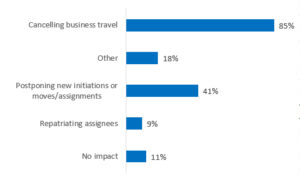
Latest Updates
Updated March 13, 2020
Now designated a global pandemic, the Novel Coronavirus that causes the disease COVID 19 has had unprecedented impact on the mobile workforce and employers worldwide. What was considered a low risk location yesterday might now be subject to entry restrictions, waiting periods and quarantines. The rapidly changing situation makes it imperative to refer to the official CDC and WHO websites but we wanted to share some of the practical implications for your mobile workforce and results from our “live” virtual benchmarking which tracked how companies are responding to the outbreak.
Results of our live virtual benchmarking sessions, conducted the week of March 9, 2020 and reflecting input from more than 100 companies worldwide, offer real time insight into how employers are responding to the outbreak:
“How is your mobility program being impacted by the spread of Coronavirus? (select all that apply)”

Results exceed 100% because of multiple choice answers.
In the chart above, “other” encompassed a wide range of responses, including:
- Canceling meeting at my own office with outside suppliers
- Allowing employees to go on with perm transfer but will self-quarantine if coming from high risk country
- No formal evacuation by the company but due to country specific initiatives it has impacted decisions we are making as an organization
- Specific countries such as Mongolia that has closed its boarders and we aren’t able to get people back to home country
- Restrictions around schools closing and children not being allowed in public places
As evidenced by these results, only a small portion of employers are repatriating their employees from assignments. Furthermore, 41% are postponing new initiations or moves/assignments. These findings align with our own practice as we work with clients around the world to share knowledge and best practices that can inform their response to the COVID outbreak. One of the most important features in any crisis is to proactively communicate with employees and help manage their expectations.
Here are just some of the down-stream impacts of the pandemic on the mobile workforce:
General Timing Expectations
- Travel restrictions and quarantines are resulting in more frequent rescheduling of services.
- Despite redundancies built into the supply chain, as the spread of the virus impacts service providers and/or if they are exposed to the virus, new assignments may need to be reassigned causing delay.
- Scheduled packing, pick-up and delivery dates may need to be adjusted.
- Delays are expected for international relocations; even U.S. outbound shipments are experiencing delays.
Changes to Shipments of Household Goods
- Government-imposed quarantines are causing a shortage of containers and might limit the availability of people to work in certain locations, causing potential delays.
- Delays in household goods may increase the need, and related costs, for interim storage (and additional benefits like furniture rental or furnished accommodations).
- As supplier partners adhere to CDC and WHO guidelines, employees should not be surprised that providers are wearing masks and gloves.
Housing Assistance
- Reflecting government imposed quarantines, certain locations are reporting limited availability or ability to provide in-market origin and destination services.
- National Association of Realtors guidance for dealing with CDC guidelines suggests that agents think about alternative property marketing to avoid exposure to the virus. These alternatives may include video tours and other methods to virtually tour a property.
- In traditional marketing processes (i.e., Open House), all visitors should disinfect their hands upon entering the home, and the agent should provide alcohol-based hand sanitizers at the entryway as well as soap and disposable towels in bathrooms. After the showing or open house, strict sanitizing protocols should be in place to disinfect the home, especially commonly touched areas like doorknobs and faucet handles.
Compliance Concerns
- Our partners at Weichert Mobility Tax Services (WMTS) have been advising clients on their specific population but advise that many jurisdictions have indicated there will be tax deadline extensions.
- Concern is increasing for employees on EBTs, STAs and other assignments that might trip the 183 day threshold in income tax treaties as a result of being quarantined in the host country.
- There is potential impact of not qualifying for the foreign earned income exclusion for US outbounds that need to meet the 330 day threshold of the physical presence test.
- It may be difficult to arrange timely mandatory pre-assignment physical exams.
Immigration Issues
- Immigration issues abound and are very fluid. As a result we recommend conferring with your provider for specific insights reflecting the nationality, location, type of visa and options.
- You may experience Visa issuance delays for those coming from highly impacted countries (China, Korea, Iran, Italy) and more countries will be added
- This may result in delays for employees trying to repatriate/return to their home country or host country (postponed end to assignment, or end to home leave)
- Our partners at Fragomen have established a special section on the home page of their public website – https://www.fragomen.com/about/news/immigration-update-coronavirus
Exceptions
In light of these extenuating circumstances, you are likely to experience an increase in exceptions. When handling exceptions, we’ll borrow a quote from one of our clients: “If it feels wrong to say no to an exception, then think about how you can accommodate the request.” To that end, here are some practical recommendations you might consider:
- Create a temporary addendum to policy. Include a statement that the addendum is temporary in nature and that the company reserves the right to amend and terminate at any time.
- Track reasons for delays and exceptions to policy to substantiate decisions and support future claims (i.e., for tax filing extensions, etc.).
- Most companies will cover reasonable travel expenses for delays and/or mandatory waiting periods/quarantines will be covered.
- Think about allowing extended temporary storage coverage for the period.
- If you still adhere to a one year rule (or other time controls) and moves can’t be completed within that timeframe, maintain documentation to support decisions to extend the move.
- If home buyouts (GBO or BVO) are outstanding and an employee is reluctant to market his or her home, consider hibernating the program and restarting at a future date. Think about how this decision could impact interim expenses if the employee has already reported to work in the new location.
- As a result of travel restrictions, entry bans or screening delays, employees may require extended temporary living.
- If employees moved using a lump sum allowance, think about how they may need to manage unexpected expenses caused by travel restrictions and address any reasonable shortfall.
While all policy addendums should be reviewed by safety, legal and HR, we think these kinds of reasonable accommodations will ensure the least disruption to your mobile workforce.
Additional Updates
We continue to monitor reports from our global network of Supplier Partners, International SOS, WorldAware and of course, the CDC and WHO.
Please also review previous posts on this blog for important regional updates and additional advice.
Latest Updates
To view our latest updates on the impact the Coronavirus is having on talent mobility please click here.